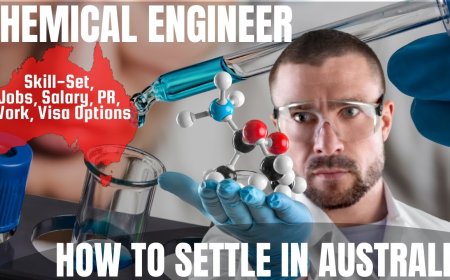Materials Engineer Career and Immigration options for Australia
Materials Engineer Investigates the properties of metals, ceramics, polymers and other materials and assesses and develops their engineering and commercial applications. Registration or licensing may be required.
Profile Title: Materials Engineer Career and Immigration options for Australia
Alternative Title:Not Defined
ANZSCO Code: 233112 | Unit Code: 2331
Skill Level: Level 1 | Work Experience: 0 Years
Assessing Bodies: Engineers Australia (EA)
Skill Occupation List (SOL): MLTSSL
Specialization: Not Defined
Profile Description: Investigates the properties of metals, ceramics, polymers and other materials and assesses and develops their engineering and commercial applications. Registration or licensing may be required.
Job Duties:
- preparing designs for chemical process systems and planning control systems for processes such as those used to remove and separate components, effect chemical changes, test and evaluate fuels, transfer heat, and control the storing and handling of solids, liquids and gases
- monitoring the operation and maintenance of equipment to achieve maximum efficiency under safe operating conditions
- ensuring correct materials and equipment are used and that they conform to specifications
- diagnosing malfunctions in chemical plants and instituting remedial action
- studying product utilisation and pollution control problems
- reviewing plans for new products and submitting material selection recommendations in accordance with design specifications and factors such as strength, weight and cost
- planning and implementing laboratory operations to develop new materials and fabrication procedures for new materials to fulfil production cost and performance standards
- conferring with producers of materials, such as metals, ceramics, polymers, cements and elastomers, during the investigation and evaluation of materials suitable for specific product applications
- reviewing product failure data and implementing laboratory tests to establish or reject possible causes, and advising on ways to overcome any problems
Skill Level Description: In Australia and New Zealand: Most occupations in this unit group have a level of skill commensurate with a Bachelor Degree or higher qualification. In some instances relevant experience and/or on-the-job training may be required in addition to the formal qualification (ANZSCO Skill Level 1). Registration or licensing may be required
Available Visa Options (As on February 2024):
- 186 - Employer Nomination Scheme visa (subclass 186)
- 189 - Skilled Independent (subclass 189) - Points-Tested
- 190 - Skilled Nominated (subclass 190)
- 407 - Training visa (subclass 407)
- 485 - Temporary Graduate (subclass 485) - Graduate Work
- 489 - Skilled Regional (Provisional) visa (subclass 489) - Family sponsored
- 489 - Skilled Regional (Provisional) visa (subclass 489) - State or Territory nominated
- 482 - Temporary Skill Shortage (subclass 482) – Medium Term Stream
- 187 - Regional Sponsor Migration Scheme (subclass 187)
- 494 - Skilled Employer Sponsored Regional (provisional) (subclass 494) - Employer sponsored stream
- 491 - Skilled Work Regional (provisional) visa (subclass 491) State or Territory nominated
- 491 - Skilled Work Regional (provisional) visa (subclass 491) Family Sponsored
Registration or Licensing: may be required
Industries: Chemical and Materials Engineers are mainly employed in: Manufacturing; Professional, Scientific and Technical Services; and Mining
Education Profile: The most common level of educational attainment for Chemical and Materials Engineers is Bachelor degree (82.2 per cent).
Job Opening: Over the five years to November 2019, the number of job openings for Chemical and Materials Engineers is expected to be low (equal to or less than 5,000). Job openings count both employment growth and turnover (defined as workers leaving their occupation for other employment or leaving the workforce).
Age Group: The main age group is 25-34 years (31.0 per cent) and the median age is 37 years (compared to 40 years for all occupations).
Gender: The female share of Chemical and Materials Engineers is 10.3 per cent and 94.8 per cent of Chemical and Materials Engineers work full time. Average weekly hours for full time workers are 40.4 (compared to 40.2 for all occupations).
Earning: There are no earnings data available for this occupation.
Employment: Employment for this occupation rose strongly (in percentage terms) in the past five years and rose very strongly in the long-term (ten years). Looking forward, employment for Chemical and Materials Engineers to November 2020 is expected to remain relatively steady.
What's Your Reaction?
 Like
0
Like
0
 Dislike
0
Dislike
0
 Love
0
Love
0
 Funny
0
Funny
0
 Angry
0
Angry
0
 Sad
0
Sad
0
 Wow
0
Wow
0






































































































